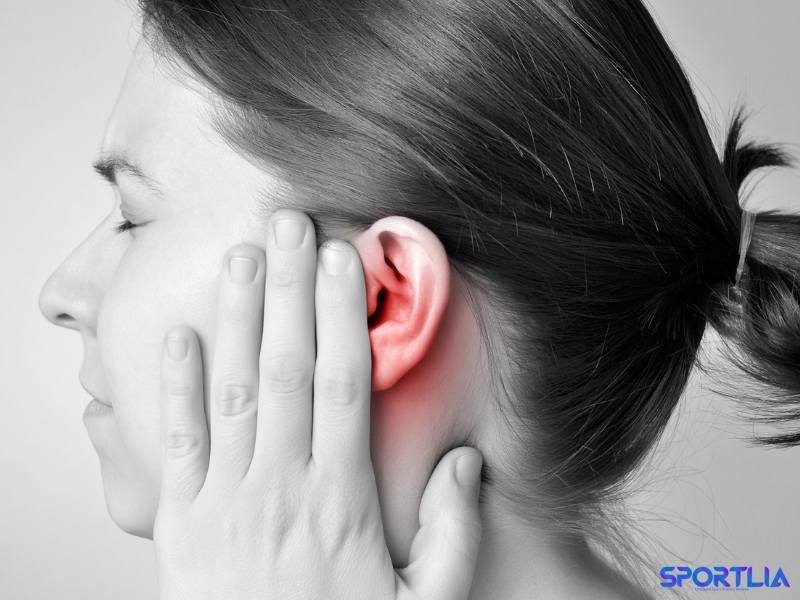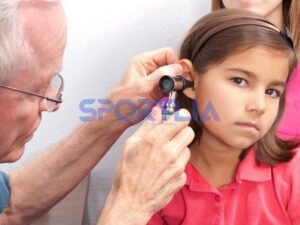Swimming is a great way to stay in shape and can be a whole lot of fun!
However, it is important to know how to keep water out of ears while swimming because if the water enters your ears and stays for too long, then bacteria will develop.
This causes an ear infection which can be very painful. The key to preventing this is to keep water out of your ears while swimming.
In this article, we will know what swimmer’s’ ears are and tips on preventing water from entering your ear to avoid ear infections.
Table of Contents
What is a Swimmer’s Ear?

A swimmer’s ear is an outer ear infection caused by water that stays inside a person’s ears for too long.
Swimmer’s ear can also be called otitis externa and is often confused with the other type of swimmer’s ear: an inner-ear infection (otitis media).
If the water enters the ear canal and stays for too long, bacteria will start growing, which will lead to an ear infection known as Swimmer’s Ear.
A typical symptom of this condition may include pain, itching, redness near the opening of the ear canal, swelling or discharge of pus from the canal, and drainage from the infected area.
A swimmer can get it if they have been swimming for a while without drying their ears properly before putting on headgear-like headphones since moisture trapped inside the ear could lead to this condition.
Another common sign is when you feel like something is stuck in your ear, more likely water ringing in your infected ear; you should try the remedies to remove them instantly to avoid such infections.
However, visit a specialist to prevent the incoming problem.
What Causes Swimmer’s Ear Infection?
Swimmer’s ear infection is caused when water stays in your ear for too long. This can happen when you swim, shower, or surf, and the water doesn’t drain out of your ears quickly enough.
As time goes on if there isn’t a break from being wet, bacteria grow inside your ear canal.
The infection starts to form when this happens because it’s not drying properly with all the moisture around and bacterial growth inside it.
Symptoms of Swimmer’s Ear
If the drying tips does not work and you feel the liquid in your ears for quite long, then you should know these symptoms and instantly visit your doctor because it will lead to infection;
- Pain or itching of the skin around the outer part of your ear (around the ear).
- Swelling and pain in the ear canal, even after you’ve dried your ears out.
- An itchy ear canal, which is a sign that an infection has occurred.
- Redness near the opening of your ear canal
- Drainage from the infected area
- A feeling that something is stuck in your ears, such as wax, dirt, or debris.
- Feeling liquid in the ears
- Tinnitus (ringing sound)
- When people are suffering from a swimmer’s ear, they will often experience hearing loss at some point during their illness.
Treatment For Swimmer’s Ear Infection
If you feel the symptoms of swimmer’s ears, don’t try to shake your head often to get rid of water.

In most cases, shaking your head on the infected ear side will help you get water out of your ears, but if you feel the water isn’t coming out, then there are chances that the swimmer’s ear infection has developed.
So don’t waste your time and book an appointment with your doctor. Your doctor will suggest the following treatment to stop the infection;
- The most common treatment for swimmer’s ears is antibiotic ear drops prescribed by your doctor.
- If you use the home remedies for temporary comfort, then pain-relieving medication ibuprofen is a good idea. However, they will give you relief from the pain for some time but not from the infection because only antibiotics can treat bacterial infection.
- You should also take care not to shake your head too often on the infected side because this can worsen the inflammation of the ear canal.
- Dry out any excess water that has found its way into your ear by tilting your head while on land or sitting down, so it falls out of your ear canal.
The most common treatment is antibiotic ear drops that must be prescribed by your doctor.
They will usually contain an alpha- or beta-lactamase inhibitor with either potassium penicillin G sodium phenoxymethylpenicillin (diluted in liquid) or cefuroxime axetil (cefditoren pivoxil).
Antibiotic ear drops should only be used if someone has seen a physician first because it can worsen an infection.

If all Fails, Immediately visit a Doctor!
Sometimes, the signs of a swimmer’s ear include swelling around one or both ears as well as temporary hearing loss in one or both ears because it blocks sound waves from passing through to our eardrums.
Both symptoms are often combined when a person has this condition, but sometimes they may only have just one sign without another present (Hearing Loss Centers).
Some over-the-counter drops are also sold to relieve symptoms of a swimmers’ ear infection.
However, Home remedies for swimmer’s ears include the use of hydrogen peroxide, salt water, and pain-relieving medication such as ibuprofen.
Things to know about Swimmer’s Ears
It is essential to know that a swimmer’s ear can be contagious, and the infection cannot spread from person to person.
Swimmer’s Ears are usually caused by bacteria, which grow when water stays for too long in your ears.
Symptoms often worsen at night or while chewing food because both actions create pressure changes in the area behind the eardrum.
Swimmer’s ear can be diagnosed by looking inside your ear with an otoscope.
There will usually also be some discharge coming from the inner part of the outer ear canal or behind your ears on your neck, so don’t worry and visit your doctor immediately.
How To Keep Water Out Of Ears While Swimming (Tips before you swim)
Now you know swimmer’s ears can worsen a day for a swimmer, so you should prepare yourself from the start to avoid such problems in the future.
To prevent getting a swimmer’s ear infection, there are hygiene tips you should follow before swimming so that water does not enter your ear.
To keep water out of ears while swimming, you should:
- Use earplugs
- Before getting into the water, put a few drops of an ear solution in your ears. You can also dip cotton balls with this solution and place them gently inside your ear canal to help keep water out of your ears while swimming.
- Wear a bathing cap to keep hair from getting wet and causing excessive moisture around the ears; this will help protect you against infection.
- Wear a swimming ear band
- Using Earplugs and a Swim cap together can prevent water from entering your ear. These both together can solve your problem.
What To Do If Water Gets Stuck in Ear?
If you feel the water getting stuck in your ear (water moving and ringing sounds), don’t panic, you can easily remove them.
Follow the below tips to get the water out of ears;
- Start tilting your head to the side of the ear where water is stuck and start jumping while keeping your head tilted to the infected side of the ear. It will help water drain out of your ear.
- Sleeping on the infected ear side will allow the water to come out from the ear.
- You may also want to try using a cotton ball or something similar to wick the water away from your ear.
- Whatever you do, don’t blow air into your ear as this could push any fluid deeper inside and lead to further complications like an infection.
- Finally, if all else fails and none of these methods work for you, it’s time to see a doctor.
Things to do After Swimming to prevent Swimmer’s Ears Infection
To avoid ear infections after Swimming, you need to dry your ears out as much as possible.
The best way is to gently tilt your head forward and use a towel or tissue paper to pat the water out of the ear canal.
Your hair will also help absorb some moisture, so putting it up in a bun or ponytail after Swimming can be helpful too.
If any water remains inside the ear canal, try tilting your head down for about 3 minutes before laying on that side again will help you.
You can do these things after swimming to prevent ears infections;
- Remove the Cotton, earbuds, swim cap, or anything you were using to keep water out of your ears while swimming.
- Clean and Dry Your Ears using a Soft towel.
- Use AfterSwim Device for Water Removal.
- Ear drops are a great way to remove water from your ears, as they clean and dry them. You can also use ear drops for the swimmer’s ears to prevent infections. They remove the buildup of bacteria and blockages, too!
- Use Ear wax – a natural defense mechanism that can help keep water out of ears while swimming.
Earwax holds up to three times its weight in water, so it is a natural defense mechanism against getting an ear infection.
Some people may have some buildup of wax that needs to be removed by a doctor; however, the ear can produce more wax to compensate for an overabundance of water.
So if you are worried about getting an ear infection because of excess water in your ear, try using wax to keep the water out.
However, the best way to make sure you’re using ear drops correctly is to follow the instructions on the bottle before you start using them. Some ear drop types have pre-measured drops for easy use on the usage guide, check prescription.
Tips for preventing ear infections in children while swimming

Children should be only allowed for swimming under adult supervision.
However, a child under four should not be allowed to swim in the pool. However, you should supervise them with proper care.
To prevent ear infection in children while swimming, you should do the following:
- Completely dry the inside and outside of your child’s ear after any contact with water.
- Avoid wearing cotton swabs or anything else that might block their ears.
- Have a health professional check their eardrums during routine well-child visits. In some cases, a doctor may prescribe antibiotic ear drops to prevent infections.
- Teach children to turn their heads from side to side while swimming, keeping water out of the ears.
- Seek medical attention quickly if there is any change in hearing or balance after going for a swim.
- Avoid bathing your child’s hair with shampoo before they go into the pool as some people are allergic, and it can lead to a swimmer’s ear.
- Elimination of water from the ears is necessary for the prevention, so it’s important that you dry your child’s hair before they go swimming; this will help them keep any water out of their ears while in the pool.
- If some water does get into your child’s ears, it’s important that you dry their hair and keep them out of the water for at least three minutes. Direct them to start tilting on the infected ear side to remove the water.
- Pushing any fluid deeper inside can lead to further complications like an infection.
- Finally, if there are any sensations or symptoms, immediately visit a health care center.
FAQs (Frequently Asked Questions) For Keeping Water Out Of Ears
What are swimmer’s ears, and how can I keep water out of my ear while swimming?
Swimmer’s ear is an infection of the outer or middle ear canal caused by water remaining in the ear canal. The infection is caused when the fluid stays in your ears for too long, and bacteria start to grow.
To prevent swimmer’s ears, take precautions to keep water out of your ears while swimming. By using earplugs, swim caps, or a hairband. Using all these together will help you keep water out of your ears.
What are the benefits of using earplugs?
Earplugs create an airtight seal in your ear canal and keep water from entering inside them.
The benefit of this is that any bacteria will not be able to grow on these surfaces as quickly when there isn’t much moisture available for them to flourish in.
The main benefits of using earplugs is to protect you from health conditions such as swimmers’ ears, swimmer’s itch, and other illnesses that can result from water staying in contact with the skin too long.
Earplugs are a great way to guard against harsh and cold environments that could hurt your ears with their temperature difference.
They also reduce background noise so that you can easily focus on your swimming techniques, Whee!
What is the best way to dry off after swimming?
The best way to dry off after swimming is by patting yourself down with a towel.
The body should be patted or rubbed briskly with a towel while the skin is still wet to encourage evaporation and cooling. Towels made from synthetic materials are best for this as they absorb water readily.
Where can I buy earplugs that stay in my ear while I’m swimming?
There are a few different types of earplugs on the market that stay in your ears while swimming.
The most popular option is to use silicone earplugs, which come in many varieties – from small and thin for water sports to large foam plugs for recreational swimmers or divers. You can find many highly rated options on Amazon.
Will the swimmer’s ear go away by itself?
In rare cases, the swimmer’s ear will go away on its own. If you want to get rid of it fast and naturally without medication, try remedies for removing water from the ears while swimming before showering and after, as described in this article.
How long can a swimmer’s ear last without treatment?
The length of time that a swimmer’s ear lasts without treatment varies from person to person.
Some people may only experience the condition for a few days, while others might have it for a few weeks and months, depending on how fast you take action after discovering the symptoms.
Why does it hurt when my ear gets wet even though it’s only on one side?
The pain can be due to pain from dryness in the ear canal, swimmer’s ear (an infection of the external canal of the ear), or a burst of a blood vessel.
To prevent swimmer’s ear and dryness-related pain, it is essential to keep your ears as clean as possible by washing the outer surface with water over a washcloth for at least 20 seconds and drying thoroughly afterward.
If you are using any sort of soap, make sure not to put anything down your canal—just on the skin.
It is also crucial to dry off any moisture that has gotten into your ears after taking a shower or after swimming so that bacteria cannot grow. Gently shake the water out, making sure not to scrub excessively or put any pressure on the ear canal.
Do swimmer’s ears happen because of a cold or allergies?
No. Most swimmer’s ear infections are caused by bacteria that thrive in water and infect the outer parts of your ear canal.
Still, this condition can also be related to allergies or colds if you have a predisposition for getting it.
How to prevent swimmer’s ears?
Preventing a swimmer’s ear can be as simple as taking a few precautions.
Maintain good hygiene by drying your ears thoroughly after swimming.
Drying the protective skin in your external canal with a towel or hair dryer will help to prevent bacteria from entering.
If you’re prone to getting this condition, try not to go into the water if you have a cold or allergies.
How to treat a swimmer’s ear?
If you suspect that your ears are infected with bacteria, it is crucial to see a doctor as soon as possible and get antibiotics for the infection. You can also try using drops in your external canal (eardrops) or taking ibuprofen or acetaminophen for the pain.
What can happen if a swimmer’s ear is left untreated?
If Left untreated, an infection of this type could result in fluid buildup behind your eardrum and lead to hearing loss. This condition is also uncomfortable and may last up to two weeks.
How many people experience swimmer’s ears?
It’s challenging to know the number of people who have swimmer’s ears, but it is estimated that about 40% of all swimmers experience this condition at least once. Disease Control and Prevention estimate that more than 2.4 million people visit doctors per year.
Conclusion
As you can see, a swimmer’s ear is a condition that affects the outer parts of your ear canal. It typically happens because water and bacteria mix together in this area, but it may also be related to allergies or colds if you are predisposed to get it.
The best way to prevent swimmer’s ears is by drying off after swimming and not going into the water when you have these conditions.
If you think that your ears are infected with bacteria, talk to a doctor as soon as possible about what antibiotics they recommend for treatment.
Because if Left untreated, an infection of this type could result in hearing loss or fluid buildup behind your eardrum, which will only make things more uncomfortable until they’re adequately treated!





